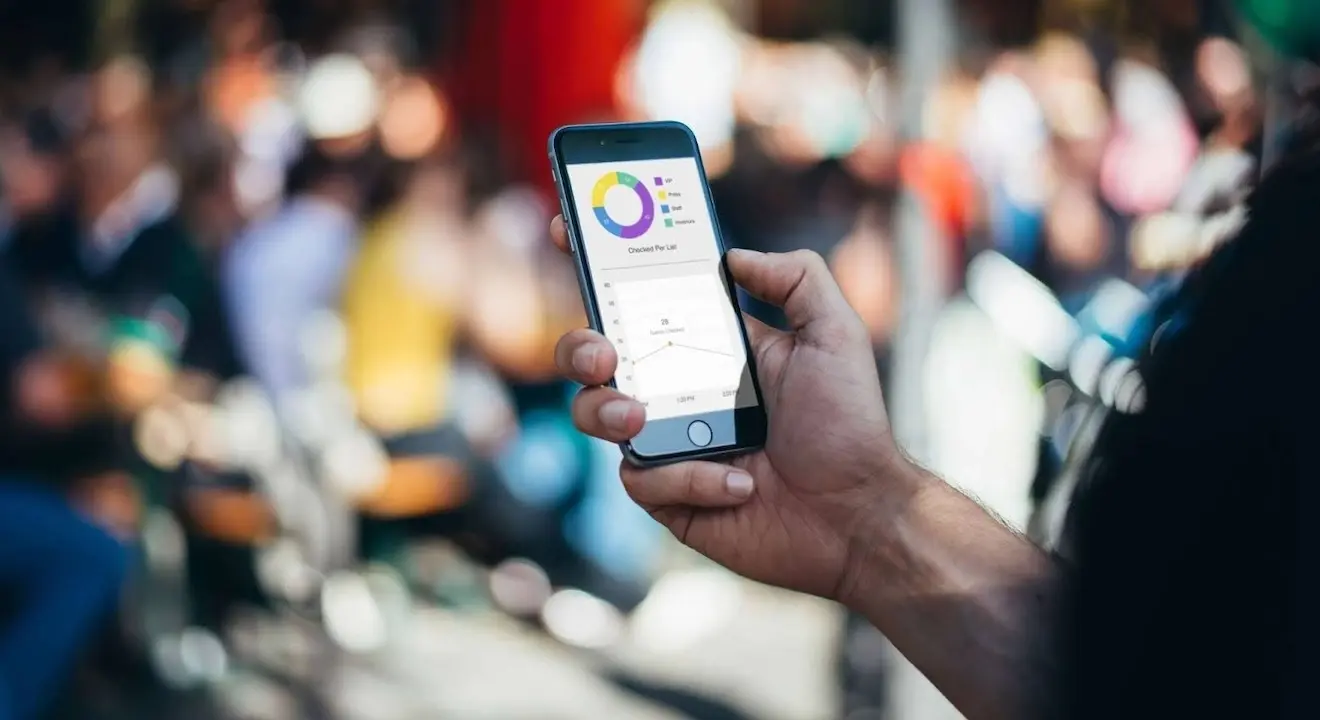Event planners want every event they organize to be a huge success, and every subsequent event to be better than the last.
One way to make that happen is to measure and analyze the success of each event and use what you learn to help you plan the next one.
While every event is different and will have a different measure of success, there are some core steps to follow before, during, and after each event to understand how successful it was.
From setting KPIs and event goals during planning to assessing feedback and revenue generated, here’s how to measure event success like the best planners in the business.

Define what event success means during the planning stage
Measuring the success of an event isn’t something you do only after the event has ended. There are also steps to take before and during the planning process.
Outline your event goals before you start the planning process
Depending on the type of event you’re organizing, the success of your event may hinge on very different goals.
For example, the goal of a trade show or a professional conference may be to create networking opportunities. The goal of a charity event may be to raise money or connect with potential new donors. The goal of a product launch may be to increase sales or generate leads. Social events may aim to build brand awareness for sponsorships, while a corporate event may aim to recruit or train employees.
Since the definition of success varies for different types of events, it’s important to isolate your goals and identify what success means to you. Be sure that your clients and stakeholders communicate their goals clearly so that you can plan accordingly and help them meet or exceed those expectations.
Establish event KPIs at the onset of the planning process
Once you’ve clearly defined your event goals, determine a list of success metrics, or key performance indicators (KPIs), to measure your success or failure.
Depending on the type of event, your KPIs might include:
- RSVPs or tickets sold
- Attendance rates
- Funds raised
- Potential donors converted
- Potential donors collected
- Post-event sales
- Conversion rates
- Profits generated
- Social media mentions
- Amount of media coverage
- Lead generation
- Increased website traffic
- Positive feedback received
- Relationships and connections created or enhanced
Once you’ve determined your KPIs, use event planning and management software to track real-time data and provide post-event insights and reports.
Event management software is the most effective way to evaluate the success of your event because not only does it give you real-time analytics, it also helps you measure ROI through one unified platform.

Measure event success after the event
To some degree, event management software can help you gauge an event’s success while it’s happening, but it’s not until after the event that the most critical analyses occur.
Calculate event ROI
While ROI may not be a relevant metric for every client or type of event, many event organizers measure success based on a single fact: return on investment.
To calculate ROI (net profit), deduct all overhead costs and expenses from the total revenue generated by the event.
Understanding your event ROI allows you to make better decisions regarding vendor costs, ticket prices, and other variables that affect the bottom line.
It’s also important to calculate and compare the total number of people who RSVP or buy tickets to check-in rates. Since it’s not uncommon for guests who sent RSVPs to later turn into no-shows, comparing the number of registrations, tickets sold, and RSVPs received to the actual number of check-ins can provide insight into your retention rates and how well your pre-event marketing campaign performed.
Gather feedback and conduct post-event surveys
Always gather feedback to learn what guests, clients, and sponsors thought about the event. The best way to do this is to send post-event surveys to guests via email or text communications, asking them about specific aspects of the event and their overall guest experience.
Send post-event surveys to sponsors to get their feedback, as well. The more qualitative data you gather from guests after the event, the better, but try to keep your surveys brief and to the point. Concise, easy-to-complete surveys typically have higher response rates.
As for your client or stakeholders, speak to them directly and ask for their feedback on everything from small details to the overall event impact. The real measure of your event’s performance is whether clients and hosts feel it was a success.
Monitor social media engagement
After the event, track social media engagement to see what guests, clients, and sponsors share about their event experiences.
By creating a catchy, easy-to-remember hashtag for your event beforehand, you’ll make it easier to conduct post-event tracking and obtain real-time attendee satisfaction data from guests who post during the event.
Track your sponsors’ post-event sales
With certain types of events, like brand-sponsored charity events, private shopping events, and product launches, your sponsors will likely track their website traffic, leads generated, and post-event sales or donations.
Ask clients and sponsors to provide post-sales data to see if your event helped to increase sales or revenue, increase conversion rates, or generate leads. Use what you learn to optimize how you approach your next event.
Use data to better measure the success of an event
Analyzing data can help you better understand the guest experience, which can help you plan even more successful events in the future.
When measuring success, look at all key metrics, including:
- RSVPs
- Ticket sales
- Audience engagement levels
- Number of attendees
- Social media engagement
- Post-event sales
- Customer/sponsor satisfaction surveys
No matter what type of events you organize, you can rely on zkipster’s event management software to analyze event metrics and gain valuable insights, such as ROI and attendee engagement levels.
When measuring event success, don’t forget to identify your KPIs
Event success means different things to different people, and how you measure success depends on your event goals. Establish goals and identify KPIs before you start planning. Keep those goals and KPIs in mind throughout the planning process.
When the event is over, compare your results to your original goals. The insights you gather from each event become the foundation for continuous improvement, enabling you to refine your approach and create increasingly impactful experiences for your guests.
Header image: Holi High Tea New York City 2025 at Nubeluz by José Andrés at The Ritz-Carlton New York, NoMad. Photo by Madison McGaw / BFA.com ⓒ BFA 2025



